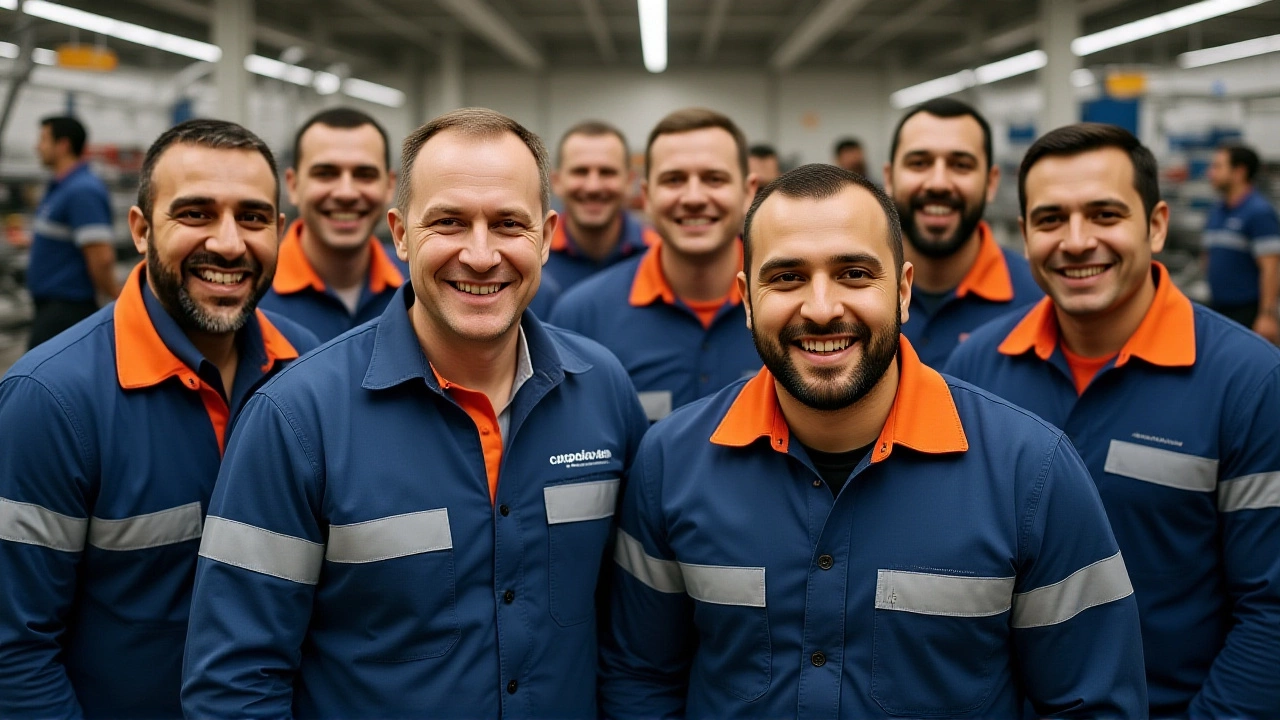Ben launches men's health training for automotive workforce on International Men's Day
 Nov, 20 2025
Nov, 20 2025
On International Men's Day, November 19, 2025, Ben unveiled a groundbreaking Men's Health Awareness training programme tailored for the automotive industry—a sector where men make up more than 82% of the workforce. The initiative, born from sobering data and decades of frontline experience, isn’t just another corporate wellness module. It’s a lifeline. And it’s needed now more than ever.
Why This Matters in the Garage and Beyond
Behind every engine repair, every assembly line shift, every midnight callout, there’s a man carrying silent burdens. Stress. Loneliness. Untreated depression. Physical injuries masked as "just tired." Ben’s latest survey found that over 99% of automotive workers had been personally affected by a health or wellbeing issue—whether their own, a colleague’s, or a family member’s. That’s not a statistic. That’s nearly everyone in the room.
And then there’s the cold reality: in the UK, one in five men die before turning 65. In an industry where physical labor is routine and emotional openness is often seen as weakness, that number isn’t surprising—it’s a warning.
The Training That Talks When Men Won’t
The new Men's Health Awareness training programme doesn’t preach. It listens. And then it equips.
Designed for managers and team members alike—regardless of gender—it gives people the language to start conversations they’ve been avoiding. How do you ask a mate if he’s sleeping? If he’s drinking too much? If he’s thinking about ending it all? The course doesn’t assume you know. It teaches you, step by step.
Topics include recognizing signs of mental health decline, understanding cardiovascular risks common in manual labor, managing chronic pain without relying on pills, and—crucially—how to hold a supportive conversation without making someone feel judged. Participants leave with a toolkit: printable guides, crisis hotlines, conversation scripts, and even sample emails to HR about wellbeing policies.
And it’s flexible. You can take it face-to-face at a dealership training room or online during a lunch break. No one’s forced to sit through a 90-minute lecture. The content is modular, digestible, and designed for shift workers.
Julie Hayes: "Silence Has a Cost"
"Too often, common health and wellbeing concerns go unspoken—and that silence can have a serious impact," said Julie Hayes, specialist services lead at Ben. "This training gives everyone the tools and resources to improve men’s health and wellbeing across the industry. We’re not here to fix people. We’re here to help them fix the space around them."
Her words carry weight. Ben has been supporting automotive workers since 1905. That’s 120 years of watching families struggle through illness, bankruptcy, isolation. This isn’t a new direction. It’s the natural evolution of a mission that’s always been about dignity.

More Than Just One Course
The Men's Health Awareness training programme is the first of three new offerings. Ben already rolled out its Equality, Diversity & Inclusion course earlier this year. Next up: a Women's Health Awareness course, launching in January 2026.
This isn’t about ticking boxes. It’s about building a culture where everyone feels seen. Where a mechanic can talk about prostate checks without shame. Where a female technician can get support for perimenopause symptoms without fear of being labeled "difficult." Where managers learn to spot burnout before someone quits—or worse.
Profits Fund Free Help
Here’s the twist: Ben doesn’t make money from this. It reinvests every penny from training bookings into its free, confidential support services. That’s right—the more employers buy this course, the more people get free counseling, debt advice, mental health coaching, and even home visits.
Right now, Ben is running its sixth-year wellbeing support project, which ends December 15, 2025. It’s a safety net for those drowning in bills, grief, or isolation. The training programme isn’t meant to replace that. It’s meant to prevent the need for it.

What’s Next?
Ben is actively pitching to major manufacturers, dealerships, and fleet operators. They’re not asking for donations. They’re asking for partnerships. "We want every garage, every warehouse, every head office to have this training," says Hayes. "Not because it’s nice. Because it’s necessary."
The ripple effect? Stronger teams. Fewer absences. Lower turnover. And, most importantly, more men living longer, healthier lives.
Frequently Asked Questions
How does this training help men who don’t want to talk about their health?
The training doesn’t force disclosure. Instead, it teaches managers and peers how to create safe spaces—through non-confrontational language, active listening, and subtle check-ins. Many participants report that after taking the course, they noticed colleagues opening up weeks later, not because they were pressured, but because they finally felt heard.
Is this only for men in the automotive industry?
No. While focused on men’s health challenges prevalent in a male-dominated sector, the training is designed for all genders. Women in leadership roles, HR staff, and even family members of workers benefit from understanding the unique pressures men face. The goal is collective awareness, not exclusion.
What makes Ben different from other workplace wellness providers?
Ben has spent 120 years embedded in the automotive community. Their support isn’t generic—it’s tailored to shift patterns, physical strain, financial stress from freelance work, and the isolation of remote garages. Plus, all profits fund free, lifetime support for workers and their families—something no corporate wellness vendor offers.
Can small garages afford this training?
Yes. Ben offers scaled pricing based on company size, and many local automotive associations are subsidizing access for small businesses. Even a single manager taking the virtual course can start changing workplace culture. The most cost-effective part? Preventing a single suicide or mental health crisis saves far more than the training costs.
How does this connect to Ben’s existing support services?
The training acts as an early warning system. Managers who complete it are more likely to spot signs of distress and refer staff to Ben’s free counseling, debt advice, or crisis intervention services. It’s a bridge between awareness and action—turning observation into intervention before things spiral.
What’s the timeline for rollout and impact?
The programme launched November 19, 2025, and Ben aims to train 5,000 automotive professionals by March 2026. Early pilot sites reported a 40% increase in employees seeking support within three months. The real metric? Lives saved. And that’s the only number that matters.
